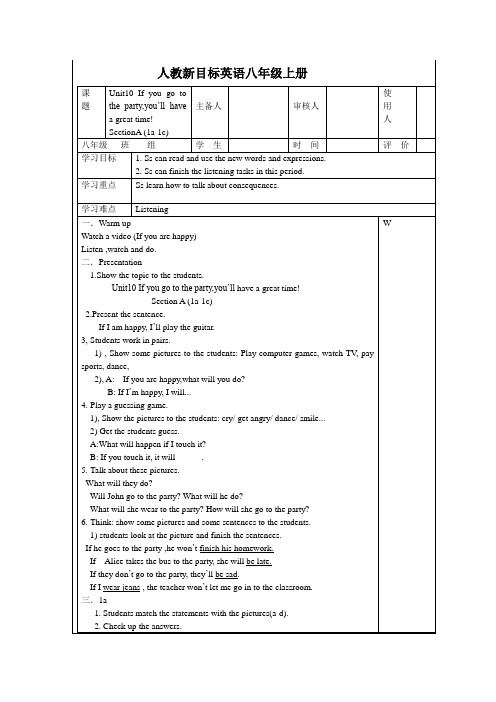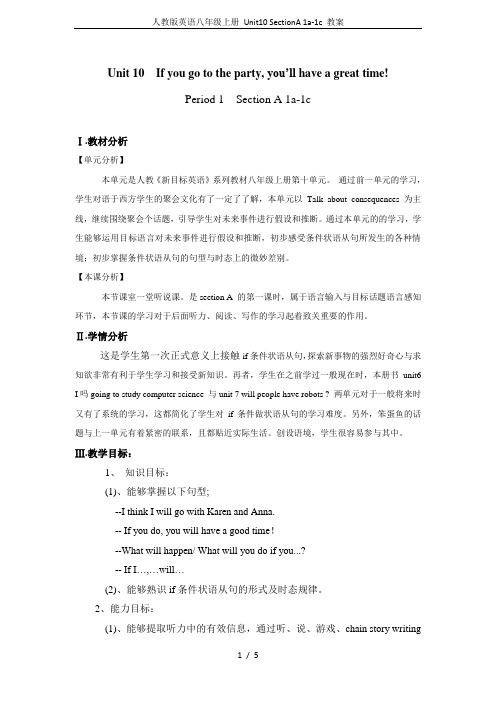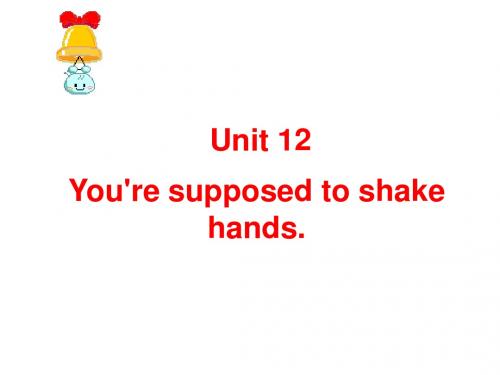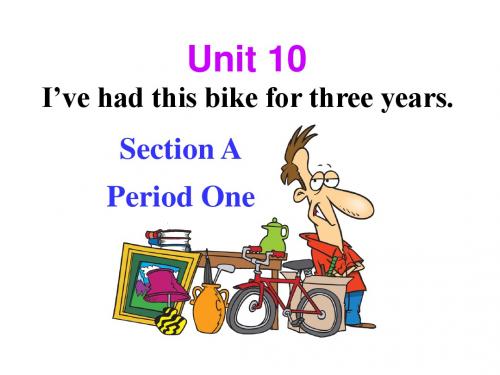2014新目标英语Unit10SectionA-1
- 格式:ppt
- 大小:3.40 MB
- 文档页数:2

班级:组名:姓名:日期:2014 编制:八年级英语备课组课题: Unit10 SectionA (1a-2d) 课时: 1(对应学生用书第61页)一、重点短语1.over there 在那边2.ride a bike 骑自行车3.yard sale 庭院售物4.bring back 带回,使想起5.give away 分发,赠送6.check out 察看;观察7.board games 棋类游戏二、重点句型1. have you had that bike over there?I’ve had it !(你拥有那边的那辆自行车多久了?我拥有它三年了!)2.You can also old things people in need.(1b,你也可以把旧东西赠送给需要的人们。
)3.I’ve had them I was a child.(2d,自从我是个孩子时就拥有它们了。
)(对应学生用书第61页)探究一 for+时间段—How long have you had that bike over there?—I’ve had it for three years!——你拥有那边的那辆自行车多久了?——我拥有它三年了!(P73)备选例句:1.My uncle has worked at this factory for five years.我叔叔在这个工厂工作已经五年了。
2.I have had the book for three months.这本书我已经买了三个月了。
现在完成时中for+时间段的用法:现在完成时可以表示过去已经开始,持续到现在的动作或状态,此时可以和表示从过去某一时刻延续到现在(包括“现在”在内)的一段时间的状语连用,如for+时间段、since+过去的时间点、疑问词how long等。
注意:此种用法中表示持续动作或状态的动词必须是延续性动词(否定句除外)【即学即练】1.他加入“绿色中国”已经三年了。


Unit 10If you go to the party, you’ll have a great time!Period 1Section A 1a-1cⅠ.教材分析【单元分析】本单元是人教《新目标英语》系列教材八年级上册第十单元。
通过前一单元的学习,学生对语于西方学生的聚会文化有了一定了了解,本单元以Talk about consequences 为主线,继续围绕聚会个话题,引导学生对未来事件进行假设和推断。
通过本单元的的学习,学生能够运用目标语言对未来事件进行假设和推断,初步感受条件状语从句所发生的各种情境;初步掌握条件状语从句的句型与时态上的微妙差别。
【本课分析】本节课室一堂听说课。
是section A 的第一课时,属于语言输入与目标话题语言感知环节,本节课的学习对于后面听力、阅读、写作的学习起着致关重要的作用。
Ⅱ.学情分析这是学生第一次正式意义上接触if条件状语从句,探索新事物的强烈好奇心与求知欲非常有利于学生学习和接受新知识。
再者,学生在之前学过一般现在时,本册书unit6 I吗going to study computer science 与unit 7 will people have robots ? 两单元对于一般将来时又有了系统的学习,这都简化了学生对if条件做状语从句的学习难度。
另外,笨蛋鱼的话题与上一单元有着紧密的联系,且都贴近实际生活。
创设语境,学生很容易参与其中。
Ⅲ.教学目标:1、知识目标:(1)、能够掌握以下句型;--I think I will go with Karen and Anna.-- If you do, you will have a good time!--What will happen/ What will you do if you...?-- If I…,…will…(2)、能够熟识if条件状语从句的形式及时态规律。
2、能力目标:(1)、能够提取听力中的有效信息,通过听、说、游戏、chain story writing等环节掌握目标语言;(2)、能用if条件状语从句对周围同学的实际问题给出合理的建议3、情感目标:(1)、能够重视因果关系,考虑自己的行为可能造成何种后果与影响。



Unit 1 How can we become good learners?一词汇运用(10分)(Ⅰ)根据句意及首字母或汉语提示完成单词。
(5分)1. It’s a s, so don’t tell anyone else.2. You should take n in class and review them after class.3. You can (记住)the new words by using them in sentences.4. Please read these sentences slowly so that I can (重复)them after you.5. I find it a bit difficult to learn English (语法).(Ⅱ)用所给词的适当形式填空。
(5分)6. Reading English aloud will help you improve your (pronounce).7. Mr Green spoke so (quick)that w e couldn’t understand what he said.8. You can learn new words by (make)word cards.9. (have)conversations with friends really improves my speaking skills.10. At first, it’s too hard for me(study)English grammar.二、单项选择(10分)1. (2014·丹东第十中学质检)—How do you study English?—I study English grammar.A. by learnB. by learningC. in learnD. in learning2. Bob finds interesting but kind of difficult to learn Chinese.A. thatB. thisC. itD. them3. (2013·衢州中考)—can you tell whether a foreigner is English or American? —Maybe by the way he speaks.A. WhyB. WhenC. WhereD. How4. (2013·孝感中考)—What can you give me on learning English?—I think you could join an English club.A. adviceB. newsC. messagesD. information5. —How could I improve my writing?—writing e-mails to your pen pal?A. Why notB. Why don’tC. HowD. How about三、完成句子(10分)1. 她说她通过做英语练习来学习语法。
Unit 10 You’re supposed to shake hands一、根据句意及首字母提示完成单词(10分)1. You should s the bottle(瓶子)before pouring the orange juice.2. If you want to go to the teacher’s office, you are supposed to k at the door before enteri ng.3. It’s good m to say “hello” when you meet each other.4. After exercising in the morning, I usually feel quite r .5. Julie k her mother good night before she went to bed.二、单项选择(10分)1. When you supposed to the meeting yesterday?A. were; hadB. was; hadC. were; haveD. was; have2. Would you when you are in town?A. drop offB. drop byC. fall offD. fall by3. He can’t carry the heavy box. He is a child.A. at firstB. after allC. at allD. above all4. She has never been to the Great Wall before. Today she sees it the first time.A. atB. forC. inD. by5. If you want to read English quickly, you must learn English words as you can by heart.A. as muchB. so muchC. as manyD. so many三、完成句子(10分)1. 他们有相当宽松的规定。
新目标英语八年级上册第10单元Unit 10 I’m going to be a basketball player.Period1: Section A (1a-Grammar Focus).一、教材分析:1.教学内容:本课是新目标英语八年级上册第10单元,教材以I‟m going to be a basketball player. 为中心话题,主要是通过学习动词的一般将来时态,讨论人生理想及对未来的打算,计划。
本课教学内容与学生的实际生活密切相关,易于引发学生大胆尝试运用简单的功能英语进行交际和交流。
Section A的主要学习内容是:一般将来时be going to +动词原形,话题由“What are you going to be when you grow up?—I‟m going to be a basketball player.”展开。
教材安排了许多听,说,读,写的任务活动,我将灵活运用这些活动引导学生仔细听,大胆说,认真读,及时写,为接下来的进一步学习打好基础。
2.教材背景:这单元通过复习和学习一些关于职业的词汇,用be going to谈论长大以后打算做什么以及打算怎样为实现目标与梦想而努力,与七年级(下)Unit 4 I want to be an actor.的内容密切相关来学习关于职业的词汇以及用want to be/do谈论将来,又和八年级(上)Unit 3 What are you doing for vacation? 用be doing谈论将来的打算有着密切的联系。
3.地位和作用:本课是这单元的第一课也是重点课,学好本课将为进一步学习一般将来时打下良好的基础,其中心话题是谈论人生理想。
通过本课时的学习,学生对be going to 这一结构表示“将来”会有基本的了解,并能初步运用这一语言结构进行交流,为最终完成任务作全面的准备,在教学中的地位是举足轻重的。
人教新目标版2013—2014年度下学期七年级英语教案主备人:备课时间:2014年月日成员:Unit 10 I’d like some noodles.Period 1(Section A 1a—1c)Ⅰ.Teaching Aims and DemandsKnowledge Objects: Key vocabulary. Target language.2. Ability ObjectTrain students’ listening and speaking skills.3. Moral ObjectNoodles are popular with people. They are traditional Chinese food.Ⅱ. Teaching Key PointsKey vocabulary, especially the names of food.Countable and uncountable nouns.Ⅲ. Teaching DifficultiesTra in students’ listening and speaking skills.Ⅳ. Teaching MethodsListening and speaking methods. Scene teaching methodsⅤ. Teaching AidsA tape recorder.Ⅵ. Teaching ProceduresStep One:GreetingsStep Two:Warm-upLet’s do some sports.(do as the teacher’s order)Step Three: Lead inT: After doing these sports , I’m tired. I’m hungry. Are you tired? Are you hungry?Ss: Yes.T:So, what would you like to eat?T: Let’s go to the restaurant to have a big meal.There are some specials there. You can choose whatev er you like”.Step Four:Section A - 1a1、show some pictures of these words and match the words with the pictures,finish section A 1a. Cabbage chicken mutton beef potatoes tomatoes carrot noodlespractice the drills “What would you like? I’d like---.”Step Five:SectionA-1b1.T: If you have lots of money, what would you like?Ss:“I’d like---.”T:“A car ? A computer ?……?”T:“If I have lots of money,I’d like to open a big noodle house.Look,this is a noodle house. A big nice noodle house! There are some great specials.Special1 is beef and tomato noodles.Special2 is cabbage and chicken noodles。